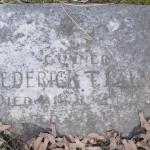BX July 6, 1915
Escapes While Serving Shell to Canadians – Driver F. Palmer Brantford Boy, Tells of Finding of a Canadian Crucified by Germans to a Barn With Bayonets – Served Shell at the Battle of Langemarck
Conversing with men of the 48th Highlanders Toronto, at Ypres, Driver Fred Thomas Palmer, of the Canadian Divisional Ammunition Column, a Brantford boy, learned that they had found a Canadian crucified to a barn door by the Germans. This he tells of in a letter to Chief of Police C. Slemin, received by him this morning.
The letter also tells of narrow escapes the writer had from German shells while delivering ammunition to the Canadian division at the Battle of Langemarck, where the Canadians covered themselves with glory. The letter follows:
June 19, 1915
Chief Slemin.
Dear Sir,
Many thanks for your kind letter I received today. I was very pleased to hear from you and to know you were well, as I am first rate at present.
I am indeed sorry that you have no word of P.C. Blanchard, but let’s hope he is no more than a prisoner of war. If he is, what an awful tale he will have to tell of his treatment. I am pleased to hear Cobden is doing so well.
Speaking about P.C. Cara, by mere chance this morning I met him and several of the Brantford boys, whom I have not seen since Valcartier camp. They came out of trenches the same day as we came down from the firing line.
While Cara has been supplying food etc., I have been supplying them ammunition in this present battle, and part of my section are still up supplying the guns. By the way, I was at the Battle of Langemarck and we supplied all the ammunition to the Canadian division up there, and believe me we had some narrow escapes. We had no less than 131 German shells come over us in a couple of hours, but we all escaped, but the damage done was fierce. I don’t know how many casualties there were, but none of our men were hit.
One morning while going along the road for ammunition a Jack Johnson shell hit the ground about 30 yards from us, throwing the dirt and splinters of the shell from the explosions all over us, and didn’t we beat it well, as fast as our horses could carry us. The shells seemed to follow us, but after an exciting gallop we got to a place of safety. That was all due to the German aircraft scouts. That was the closest thing I have had so far and believe me, too close to be comfortable.
The infantry certainly suffered. I met some of the 48th Highlanders at Ypres and they told me of how one of their men was crucified to a barn door with bayonets by the Germans, and since then I have seen it confirmed in the newspapers as being two men instead of one. The Germans are nothing but a bunch of murderers, especially now they use gas. I have seen some who have been “gassed” and they look awful, but we are now supplied with respirators, so it does not affect us so much. Another thing, there have been a great many Germans captured in Kilts taken from our dead and prisoners.
I guess I have told you all for the present and I will certainly remember you to the Brantford boys. I might just say I saw Capt. Jones, now adjutant of the 4th Battalion looking well. Lieuts., Wilkes, Thompson and Watson, of the 25th Dragoons, I have not seen, for Wilkes is with the Royal Canadian Dragoons as infantry; Lieut. Thompson, divisional cavalry, and Lieut. Watson was paymaster to the 6th Battalion. I saw Lieut. Dick Thompson once in France. So good-bye for the present – accept my best wishes and remember me kindly to all the members of the force.
Yours Sincerely,
Driver F. Palmer

